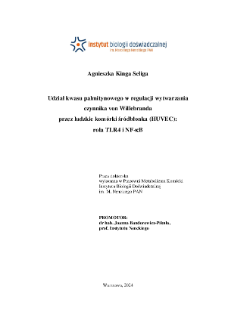- Wyszukaj w całym Repozytorium
- Piśmiennictwo i mapy
- Archeologia
- Baza Młynów
- Nauki przyrodnicze
Wyszukiwanie zaawansowane
Wyszukiwanie zaawansowane
Wyszukiwanie zaawansowane
Wyszukiwanie zaawansowane
Wyszukiwanie zaawansowane

Obiekt
Tytuł: Udział kwasu palmitynowego w regulacji wytwarzania czynnika von Willebranda przez ludzkie komórki śródbłonka (HUVEC) : rola TLR4 i NF-ĸB : praca doktorska
Twórca instytucjonalny:
Instytut Biologii Doświadczalnej im. Marcelego Nenckiego PAN
Współtwórca:
Bandorowicz-Pikuła, Joanna (1965- ) : Promotor
Wydawca:
Instytut Biologii Doświadczalnej im. Marcelego Nenckiego PAN
Miejsce wydania:
Opis:
[1], 132 strony : ilustracje ; 30 cm ; Bibliografia ; Streszczenie w języku angielskim
Uzyskany tytuł:
Dyscyplina :
Instytucja nadająca tytuł:
Instytut Biologii Doświadczalnej im. Marcelego Nenckiego PAN ; nadanie stopnia: 2024
Typ obiektu:
Abstrakt:
Dysfunkcja śródbłonka jest jednym z początkowych etapów zaburzeń w działaniu układu sercowo-naczyniowego obserwowanym u osób otyłych. Zwiększone stężenie kwasów tłuszczowych towarzyszące otyłości, w tym kwasu palmitynowego (PA) występującego w największej ilości, może przyczyniać się do rozwoju zaburzeń śródbłonkowych. Czynnik von Willebranda (vWF) wytwarzany i wydzielany głównie przez komórki śródbłonka, pełni ważną rolę w regulacji krzepnięcia. Wzrost stężenia vWF w osoczu osób chorych na otyłość może przyczyniać się do zwiększenia ryzyka rozwoju chorób sercowo-naczyniowych. Celem niniejszej rozprawy doktorskiej było zbadanie wpływu PA na wydzielanie vWF przez komórki HUVEC. Doświadczenia prowadzono w łagodnych warunkach stresu wywołanego obecnością kwasu tłuszczowego, to znaczy takich, które były wystarczające do spowodowania wzrostu ilości białek adhezyjnych ICAM-1 i VCAM-1, co jest znacznikiem odpowiedzi prozapalnej śródbłonka, ale nie obniżających przeżywalności komórek. Komórki inkubowano w obecności PA o stężeniu nieprzekraczającym 200 μM nie dłużej niż 48 h. Takie podejście umożliwia badanie zmian adaptacyjnych odpowiedzi na bodziec. Wykazano, że w łagodnych warunkach, wydzielanie vWF jest zwiększone po inkubacji w obecności PA, co jest skutkiem zwiększonej ekspresji genu VWF oraz stymulacji dojrzewania tego białka. Podjęto próby identyfikacji mechanizmów regulacyjnego wpływu PA na dojrzewanie i wydzielanie vWF, ale nie uzyskano rozstrzygających wyników. Potwierdzono, że PA aktywuje czynnik transkrypcyjny NF-κB, biorący udział w regulacji odpowiedzi zapalnej. Ponadto wykazano, że PA wpływa na zawartość białek receptorowych TLR2, TLR4, TLR6. W celu identyfikacji szlaku sygnałowego aktywowanego przez PA stosowano inhibitory NF-κB oraz TLR2 i TLR4, czyli odpowiednio kardamoninę, C29 i TAK-242. Wykazano, że zwiększona w obecności PA ekspresja genu VWF wynika z aktywacji NF- κB. Ponadto potwierdzono udział receptora TLR4 w aktywowanej przez PA odpowiedzi komórek śródbłonka. W obecności inhibitora TLR4 i PA, który jest jego ligandem, wykazano zwiększenie ekspresji genów CD36, TIRAP, TLR6, kodujących białka uczestniczące w przekazywaniu sygnału pochodzącego od receptorów TLR. W obecności inhibitora TLR2 obserwowano zwiększenie aktywności TLR4. Co więcej, wyciszenie ekspresji genu TLR2 spowodowało zwiększenie ilości białka TLR4. Z kolei wyciszenie ekspresji genu TLR4 spowodowało zwiększenie ilości białka TLR2, co zaobserwowano nawet wtedy, gdy na skutek wyciszania obniżeniu ulegał jedynie poziom transkryptu TLR4. Podsumowując, wykazano, że PA reguluje w komórkach śródbłonka wydzielanie vWF poprzez zwiększoną ekspresję genu VWF oraz nasilone dojrzewanie tego białka. Zidentyfikowano udział receptora TLR4 oraz NF-κB w odpowiedzi komórek na PA. Ponadto wykazano, że pomiędzy receptorami TLR2 i TLR4 występuje efekt kompensacyjny, obserwowany na poziomie zarówno aktywności receptorów, jak i mRNA oraz białka. Uzyskane wyniki sugerują, że już stosunkowo niewielki wzrost stężenia kwasów tłuszczowych do poziomu, który aktywuje odpowiedź prozapalną, może być wystarczający do zwiększenia stężenia vWF pozakomórkowego, co potencjalnie powoduje zaburzenia krzepliwości krwi. Udział PA w regulacji wydzielania vWF częściowo tłumaczy zwiększenie stężenia vWF obserwowane w osoczu osób otyłych.
Szczegółowy typ zasobu:
Identyfikator zasobu:
Źródło:
IBD PAN, sygn. 20521 ; kliknij tutaj, żeby przejść
Język:
Język streszczenia:
Prawa:
Prawa zastrzeżone - dostęp nieograniczony
Zasady wykorzystania:
Właściciel praw autorskich:
Zgoda na udostępnienie pracy w formie cyfrowej wyrażona oświadczeniem autora
Digitalizacja:
Instytut Biologii Doświadczalnej im. Marcelego Nenckiego Polskiej Akademii Nauk
Lokalizacja oryginału:
Biblioteka Instytutu Biologii Doświadczalnej im. Marcelego Nenckiego PAN
Dostęp:
Kolekcje, do których przypisany jest obiekt:
- Repozytorium Cyfrowe Instytutów Naukowych > Kolekcje Partnerów > Instytut Biologii Doświadczalnej PAN
- Repozytorium Cyfrowe Instytutów Naukowych > Kolekcje Partnerów > Instytut Biologii Doświadczalnej PAN > Prace dyplomowe
- Repozytorium Cyfrowe Instytutów Naukowych > Kolekcje Partnerów > Instytut Biologii Doświadczalnej PAN > Prace dyplomowe > Prace doktorskie
- Repozytorium Cyfrowe Instytutów Naukowych > Piśmiennictwo
- Repozytorium Cyfrowe Instytutów Naukowych > Piśmiennictwo > Prace dyplomowe
Data ostatniej modyfikacji:
Dec 12, 2024
Data dodania obiektu:
Oct 28, 2024
Liczba pobrań / odtworzeń:
1
Wszystkie dostępne wersje tego obiektu:
https://rcin.org.pl./publication/279285
Wyświetl opis w formacie RDF:
Wyświetl opis w formacie RDFa:
Wyświetl opis w formacie OAI-PMH:
Obiekty Podobne
Cabaj, Aleksandra
Gajkowska, Barbara Mossakowski, Mirosław Jan (1929–2001)

 INSTYTUT ARCHEOLOGII I ETNOLOGII POLSKIEJ AKADEMII NAUK
INSTYTUT ARCHEOLOGII I ETNOLOGII POLSKIEJ AKADEMII NAUK
 INSTYTUT BADAŃ LITERACKICH POLSKIEJ AKADEMII NAUK
INSTYTUT BADAŃ LITERACKICH POLSKIEJ AKADEMII NAUK
 INSTYTUT BADAWCZY LEŚNICTWA
INSTYTUT BADAWCZY LEŚNICTWA
 INSTYTUT BIOLOGII DOŚWIADCZALNEJ IM. MARCELEGO NENCKIEGO POLSKIEJ AKADEMII NAUK
INSTYTUT BIOLOGII DOŚWIADCZALNEJ IM. MARCELEGO NENCKIEGO POLSKIEJ AKADEMII NAUK
 INSTYTUT BIOLOGII SSAKÓW POLSKIEJ AKADEMII NAUK
INSTYTUT BIOLOGII SSAKÓW POLSKIEJ AKADEMII NAUK
 INSTYTUT CHEMII FIZYCZNEJ PAN
INSTYTUT CHEMII FIZYCZNEJ PAN
 INSTYTUT CHEMII ORGANICZNEJ PAN
INSTYTUT CHEMII ORGANICZNEJ PAN
 INSTYTUT FILOZOFII I SOCJOLOGII PAN
INSTYTUT FILOZOFII I SOCJOLOGII PAN
 INSTYTUT GEOGRAFII I PRZESTRZENNEGO ZAGOSPODAROWANIA PAN
INSTYTUT GEOGRAFII I PRZESTRZENNEGO ZAGOSPODAROWANIA PAN
 INSTYTUT HISTORII im. TADEUSZA MANTEUFFLA POLSKIEJ AKADEMII NAUK
INSTYTUT HISTORII im. TADEUSZA MANTEUFFLA POLSKIEJ AKADEMII NAUK
 INSTYTUT JĘZYKA POLSKIEGO POLSKIEJ AKADEMII NAUK
INSTYTUT JĘZYKA POLSKIEGO POLSKIEJ AKADEMII NAUK
 INSTYTUT MATEMATYCZNY PAN
INSTYTUT MATEMATYCZNY PAN
 INSTYTUT MEDYCYNY DOŚWIADCZALNEJ I KLINICZNEJ IM.MIROSŁAWA MOSSAKOWSKIEGO POLSKIEJ AKADEMII NAUK
INSTYTUT MEDYCYNY DOŚWIADCZALNEJ I KLINICZNEJ IM.MIROSŁAWA MOSSAKOWSKIEGO POLSKIEJ AKADEMII NAUK
 INSTYTUT PODSTAWOWYCH PROBLEMÓW TECHNIKI PAN
INSTYTUT PODSTAWOWYCH PROBLEMÓW TECHNIKI PAN
 INSTYTUT SLAWISTYKI PAN
INSTYTUT SLAWISTYKI PAN
 SIEĆ BADAWCZA ŁUKASIEWICZ - INSTYTUT TECHNOLOGII MATERIAŁÓW ELEKTRONICZNYCH
SIEĆ BADAWCZA ŁUKASIEWICZ - INSTYTUT TECHNOLOGII MATERIAŁÓW ELEKTRONICZNYCH
 MUZEUM I INSTYTUT ZOOLOGII POLSKIEJ AKADEMII NAUK
MUZEUM I INSTYTUT ZOOLOGII POLSKIEJ AKADEMII NAUK
 INSTYTUT BADAŃ SYSTEMOWYCH PAN
INSTYTUT BADAŃ SYSTEMOWYCH PAN
 INSTYTUT BOTANIKI IM. WŁADYSŁAWA SZAFERA POLSKIEJ AKADEMII NAUK
INSTYTUT BOTANIKI IM. WŁADYSŁAWA SZAFERA POLSKIEJ AKADEMII NAUK




































